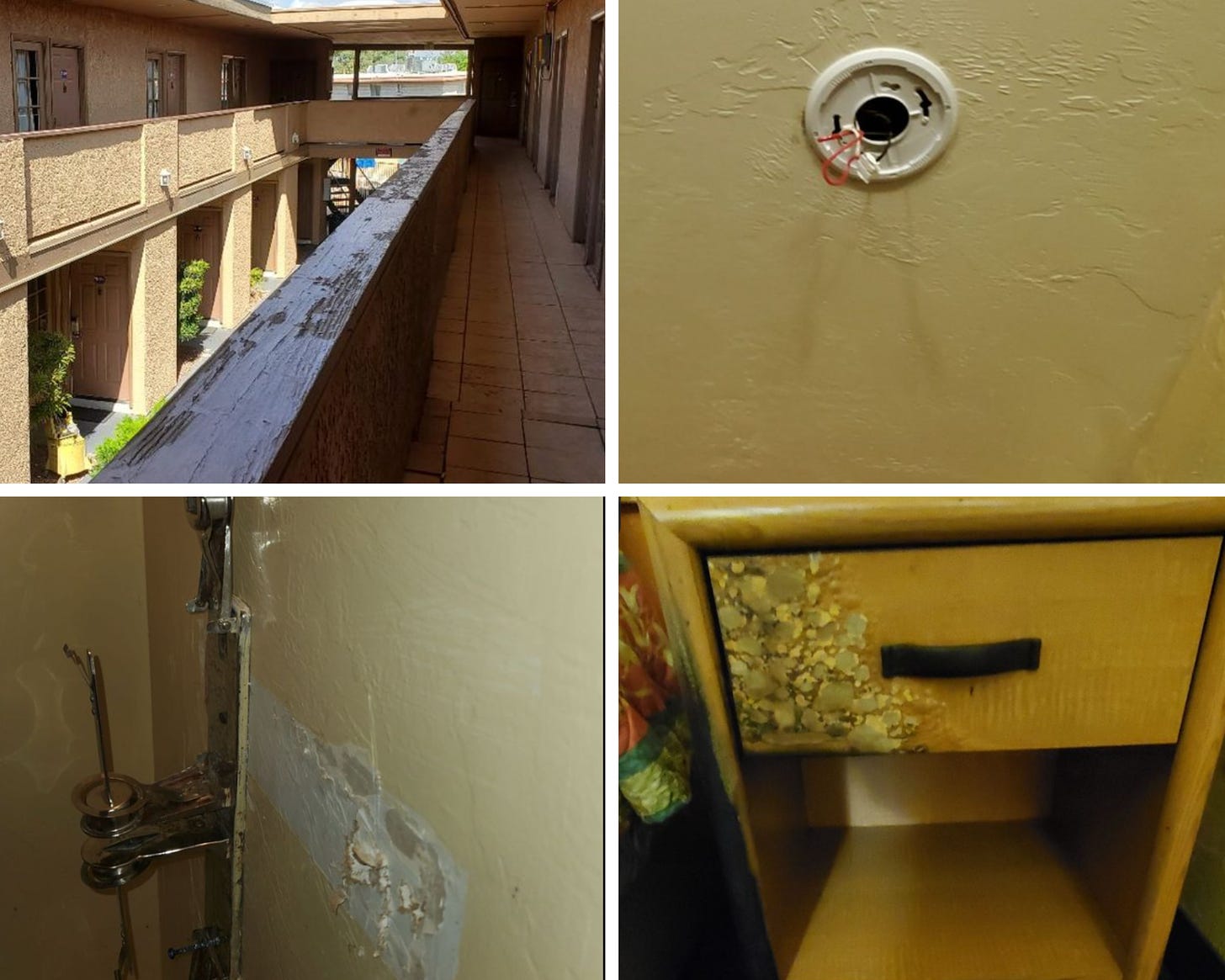The Daily Agenda: When worlds collide
The city and county have teamed up to offer emergency eviction housing ... Their first project is almost up and running ... Deflection program picking up steam.
The City of Tucson and Pima County have ventured into the property business together, with the July purchase of the Knights Inn.
The east side motel is replacing the Comfort Inn Suites as the location of the county’s Emergency Eviction Legal Services Emergency Housing program, which provides shelter and assistance to people and families facing eviction.
County officials compared working with this particular population to trying to save people from going over a cliff, saying that many times, program participants are able to get back on their feet faster than individuals who have been chronically homeless.
The plan is for the county to pay the city a monthly fee to cover building costs, like maintenance, utilities and security, while the county will handle program costs.
The project is a little behind its Labor Day move-in date, but it seems like things have still moved pretty fast, given what we know about both the speed of bureaucracy and the Knights Inn’s history.
The city had to make a considerable amount of improvements and upgrades to the property, since it was “in a condition that was not what we wanted to see for the population that’s going to move in there,” said Andy Flagg, the county’s community and workforce development deputy director.
Flagg’s description of the motel’s dire state is a bit of an understatement. The Knights Inn was pretty sketchy and had long been a hot spot for criminal activity.
From 2015 to 2020, five homicides and 29 non-fatal shootings took place at the Knights Inn, and in 2020, police were called to the motel 130 times. It was such a frequent stop for police that in 2021, it became the subject of a Tucson Police Department crime reduction project.
The repurposed Knights Inn — which will reopen with a new name — sounds like an upgrade for the surrounding community as well, as the motel will also partner with local groups to provide residents with resources like case management, job development, health care and more.
In August, city and county officials held a community event at nearby Freedom Park, inviting neighbors and residents to come and learn more about the project.
Flagg said the event drew a mix of people who lived in the area and representatives from various community agencies, and the overall sentiment was positive.
“We want to be and will be a better neighbor than the hotel previously was,” Flagg said.
In addition to cosmetic improvements, officials are taking steps to ensure both residents and community members will be safe, Flagg said, including:
24-hour on-site presence by staff or security
A dedicated TPD phone number to report issues at the property
24-hour, on-call access to a county employee for residents
Improvements to the property to better control the flow of traffic
Flagg said the county had long wanted to provide shelter options that offer occupants private living spaces as part of its eviction services, and partnering with the city, which has experience in this area, just made sense.
The move to the larger property also made sense from a financial perspective, he said, with the per-room, per-night cost dropping from $104 to $34.
That amounts to a savings of approximately $900,000 over the term of the intergovernmental agreement, which runs through Dec. 31, 2024 with the option to renew for up to nine additional years.
We love taking readers behind-the-scenes and exploring the projects and processes in our community. Help us keep doing this work.
The purchase of the motel also allows the program to serve more people at a time. The Knights Inn has 67 rooms, compared to the Comfort Inn Suites’ 38 rooms.
It also has a common area that can be used for job searches and various workshops, something program coordinators didn’t initially see the value in having.
Flagg said that while the Emergency Housing program’s goal is to never operate at the speed of government, this process has been surprisingly smooth and they’ve been lucky in terms of pace and collaboration with the city.
“We had the intergovernmental agreement go to the board of supervisors on a Monday, it went to the city Tuesday and it was in effect on Wednesday,” Flagg said.
With people set to begin moving into the motel in a few weeks, it sounds like Flagg and others have indeed been able to operate beyond the speed we’re used to seeing from local government.
Election resignation: Cochise County Elections Director Bob Bartelsmeyer resigned on Friday, Terri Jo Neff reports for the Herald/Review. The other two employees at the elections department started working there this summer, leaving a lack of expertise right before local elections dealing with property taxes and a bond election for a school district. And as our sister newsletter, the Arizona Agenda, points out, you’d have to be crazy to take that job, given the ongoing election shenanigans in the county.
If a cactus falls in the desert: Roughly 1,200 saguaros were toppled or sheared during a windstorm in late August at Saguaro National Park-West, according to a National Park Service count, the Arizona Daily Star’s Tony Davis reports. The count took nearly two weeks and focused in the Avra Valley west of the Tucson Mountains. Of the 1,200 fallen or damaged saguaros, about 15% are still standing but had their tops cut off, and a smaller percentage lost arms, but remain upright.
Picking up steam: The Tucson Police Department’s Pre-Arrest Deflection Program is showing measurable results five years after its launch, Arizona Public Media’s Paola Rodriguez reports. The program lets officers use discretion for people with substance use issues and help them access treatment rather than making an arrest. Researchers found that there have been an average of 59 deflections per month over a three year period and more than 1,782 people were encouraged to seek treatment in that time.
Lizards help us learn: A new study by University of Arizona researchers shows climate change is causing extinctions at an increasing rate, UA News’ Niranjana Rajalakshmi writes. Scientists studied populations of the Yarrow’s spiny lizard in 18 mountain ranges in southeastern Arizona and analyzed its rate of climate-related distinction over time. They found that 70 years' worth of climate-related extinction occurred in only seven years.
Property taxes peak: Pima County’s Continental Elementary School District — a one-school district without a high school — will be impacted more than any other district in the state by a 2022 law that will see property taxes rise 16.7% for those in the district, the Green Valley News’ Jamie Verwys writes. Six districts across the state are affected, but not to the level of CESD.
Build your own basin: City Councilman Kevin Dahl’s office is hosting a rain garden planting event this Saturday from 8 to 11:30 a.m., where attendees can learn the basics of rainwater harvesting and how to “plant the rain” to support native shade trees and pollinator plants. Participants will take home a “Building Your Own Basin” kit, which will include a 1-gallon native shade tree, a native bunch grass, a shrub, bag of mulch and instructions. The event is free and open to the public, but advanced registration is required.
451: The number of paid subscribers that are reading the Tucson Agenda. We told you in our one-month update that we need about 900 paying subscribers to make it through our first year, and we’re officially halfway there! We’re also really close to hitting 2,000 total subscribers, so how about you share our work with some friends and help us round out that number?











